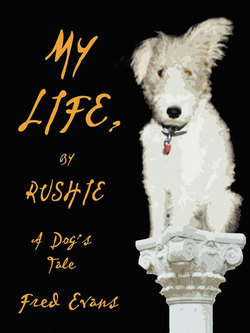Читать книгу My Life, by Rushie - Fred Evans - Страница 4
На сайте Литреса книга снята с продажи.
ОглавлениеAUTHOR’S FOREWORD
An autobiography by a dog? I know you’re thinking that’s preposterous. Who ever heard of a dog telling her own story? While unusual, I assure you—dog’s honor—this is my story. My thoughts have been faithfully transcribed in this book.
To the skeptical reader, I’ll be the first to admit that there are good reasons for the scarcity of canine literature. Paws are a major issue. It’s hard to hold a pen, almost impossible to type.
Although dogs can understand human (and some of us have a large vocabulary), it is our inability to speak human that is the major obstacle in the development of canine literature. Not only does it rule out dictation, because all literature is written in human, most dogs don’t even consider recording their experiences. Dogs may think about careers as herders, guards, hunters, and companions but rarely as writers. In fact, writing this autobiography never crossed my mind until by chance I happened on to the diary kept by my human father, D.1 In his diary, D described particular events of my life. As I read the diary, I was shocked at how profoundly M&D, who love me dearly and whom I love in return, misunderstood me.
Given my privileged upbringing and advanced education (I have graduated from two obedience schools, but was largely home schooled), I thought, “Rushie, you have an obligation to yourself and to future generations to set the record straight.” My intention, first and foremost, is to tell my story, but I also hope to make a small contribution to human understanding of dogs.
For readers of a literal bent, I did not actually write this book—not in the sense of putting pen to paper or typing on a laptop. (I don’t ask the reader to believe that I miraculously grew fingers and opposable thumbs.) I used a rather simple literary device common among celebrities and important historical figures: I told my story to someone who could write it for me. I chose D as my ghostwriter because over the years we’ve developed a very special ability to communicate.
He’s transcribed my thoughts faithfully, if not always eloquently. I’d have preferred a better writer, but one does not choose one’s parents, and I thank him for giving me the opportunity to express my views.
The reader will note that the book’s format is unique for an autobiography in that it isn’t written entirely by me. I first quote relevant portions of D’s diary and then add my comments. I do this because it documents the frequent miscommunication between dogs and humans while allowing me to tell the reader about my interesting and unusual life.
Although the book begins with my first memories as a puppy, it was written over the past two years, beginning just six months after I discovered D’s diary entries and ending with this Foreword.
To all of the dog owners who read this I hope you enjoy my autobiography and learn something about your dog in the process. To all of the dogs who will never read this but nevertheless will benefit, you may thank me at the Rainbow Bridge.
White Rush
February 6, 2006
1. My human parents consist of Fred Evans, my father, and Natalie West my mother. Our family is close and I consider their relatives my relatives and their friends my friends. As I grew up, however, I ceased calling them “Mom” and “Dad” and referred to them instead as “M” and “D.” I’m not totally sure why I did this, certainly not because I thought less of them as an adult than as a puppy. Perhaps it was because of the security, navigation, and other responsibilities I had implied a more equal relationship than is typical between a human and a dog. In life I began calling them M and D about the age of two. In the book I refer to them as M and D throughout.
